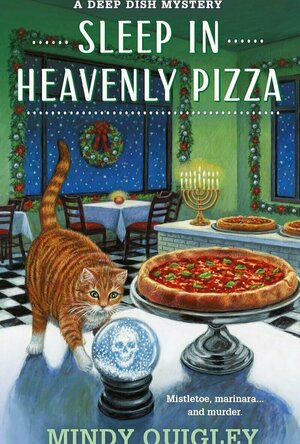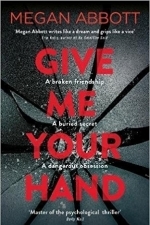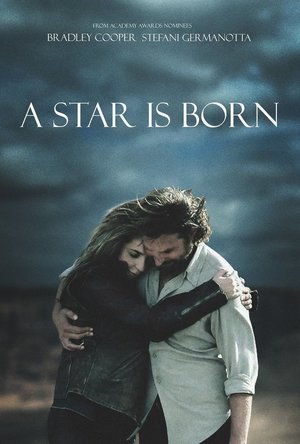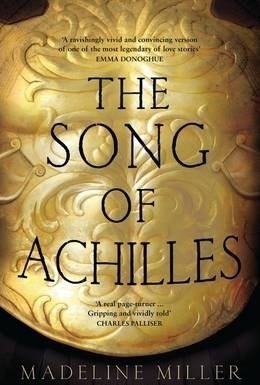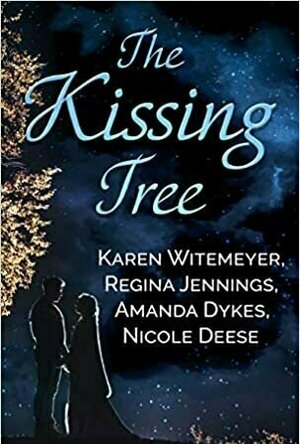Search
Search results
Mark @ Carstairs Considers (2492 KP) rated Sleep in Heavenly Pizza in Books
Dec 18, 2024 (Updated Dec 18, 2024)
Delilah’s Friends and Family are in Deep Dish
When Delilah and the staff at her restaurant cater a combined Hanukkah and Christmas dinner, Delilah is surprised to run into some family she didn’t know were in town. But the bigger surprise comes the next day when the body of one of the guests is found in a snow pile created for the snow sculpting contest. With her family and friends as the prime suspects, Delilah jumps in to clear them. But what are they hiding?
I always enjoy reading holiday books during December, and this one gave me plenty of Christmas vibes while also including Hanukkah, which was a great touch. The mystery unfolded a little differently, but still pulled me in and kept me turning the pages until I reached the logical climax. Meanwhile, the characters shine, with some nice growth for them and their relationships. There’s plenty of talk about food, and the four recipes at the end sound good. No matter when you pick up this book, you’ll find it delicious.
I always enjoy reading holiday books during December, and this one gave me plenty of Christmas vibes while also including Hanukkah, which was a great touch. The mystery unfolded a little differently, but still pulled me in and kept me turning the pages until I reached the logical climax. Meanwhile, the characters shine, with some nice growth for them and their relationships. There’s plenty of talk about food, and the four recipes at the end sound good. No matter when you pick up this book, you’ll find it delicious.

ExpenSense (Budget + Expense + Income + Account)
Finance and Productivity
App
This is a simple, easy to use app to track and control your expenses. You can also track your...
Sheridan (209 KP) rated Love, Death & Robots in TV
Apr 20, 2019
CGI is amazing (1 more)
The Perfect Mix of Morbid Humour and Gore
A Masterpiece of the Weird and Fantastical
This is going to be a long one, I'm going to review each episode as they aren't linked or related in any way, but just know, they are all gorgeous works of art and you should totally go watch the whole thing ?.
Beyond the Aquila Rift - CGI was beautiful from the moment it started, I was like 'shiiiit this series is going to be everything I love'. This one is about a crew making a delivery in space, however nothing quite goes to plan. For me, it had a very 'Mass Effect' feel with the FTL travel. I was not expecting a full out sex scene in the first 6 minutes but then again the episodes are on average only 16 minutes long. It was rauncy yet somehow, still quite tasteful, but as with most animated stuff there was an excessive amount of topless boob shots. I won't spoil it, but it ended up as a horrific mind fuck that left a shiver down my spine ?.
Secret War - Again, CGI was epic and the story was the perfect mix of unsettling, gory, and tragic. It follows a platoon of Red Army soldiers who are hunting down mysterious 'monsters'. There's blood, there's guts, a guy has an arm off at one point - what more could you ask for?
Sonnie's Edge - Immediately feels hellishly grunge and rave. I absolutely adored the blacklight effects and a strong female styling, the fight is gorgeous, the monsters have almost a Kaju feel which really made me happy as I love Pacific Rim. Of course this epicness is immediately ruined by a sloppy scene (I won't spoil it) which cemented the fact in my mind this was written by a man (I checked later and found I was correct), it does save itself with a fantastic twist at the end though so it was still an amazing short.
Sucker of Souls - This had a great grungy cartooning that felt half Kill Bill, half 2003 TMNT. It ended up being a real bad day for an archaeological expedition. Gore injected with humour is always a favourite of mine and this ticked all those boxes, including a wisecracking explosives expert (looking at you Gary!) If we've learnt anything from Indiana Jones and Rick O'Connell it's, don't fuck with tombs. This time was no different.
Three Robots - There's something just so fucking fantastic about robots going on holiday and speculating about 'human' stuff. It's just the perfect injection of morbid humour and I love it. The twist at the end had me laughing harder than I had any right to ?.
Ice Age - I haven't seen Topher Grace since That 70's Show so I was like 'heeeey cool'. This was the first one that wasn't soley animation so that was really cool. They find a civilization in their freezer - yes, you read that right, their freezer - and the story is awesome ?. It's a neat reflection on humans and our place in the world.
The Witness - Set in a brightly coloured city the animation here feels very Borderlands-y, which is super cool because I fricking love that game ?. There's murder, full frontal nudity, erotic dancing, and an ending that will tear your head right off. Pretty neat all in all.
Suits - Great Googamooga, this is my absolutely favourite so far, a perfectly normal looking farm, complete with adorable hick accents, discovers a breach in their fence. This isn't just any breach, this is an alien style swarm complete with Mech Warrior suits and a woman named Mel, who I'm convinced is Tank Girl as an old lady. 17 minutes of utter badassery you do not want to miss. Utterly LOVED it, and would 10/10 watch this as its own series.
When the Yogurt Took Over - Ok so the name - I was like 'should I take this seriously? Oooor' ?. Weirdly serious - yet hysterical. A five minute journey into what happened when Yogurt became sentient. You will not be disaappointed ?.
Good Hunting - With animation that reminds me of The Last Airbender, it's a story of magic, friendship, and the industrial age. A beautiful and tragic story, with horrific overtones of what greed and 'progress' can do.
The Dump - The animation this reminds me of would be sorta like, if the people at Pixar got high with Tim Burton. There was one random thing - I found Pearly's dick swing in the wind much funnier than any sane person probably would ?. A great story about man's best friend and let me tell ya, everyone needs an Otto ❤.
Shape-Shifter - There's something so deeply interesting about putting the supernatural into regular life. Two men, who are not human, in the US marines. Insanely intense story for under 15 minutes. Gorgeous CGI work too.
Helping Hand - This had a great "Gravity" feel to it, when everything goes wrong you just keep going, give a little and then a little more and you achieve the impossible. Breathtaking space visuals is just an added bonus ?.
Fish Night - Telltale style animation, depicts a story of a father and son on the road. The car breaks down and something both magical and tragic happens. The ending left me reeling ?.
Lucky 13 - The CGI in this one was so good it took me half the time to figure out that it wasn't real. Lucky 13 was to Cutter like the Normandy was to Joker. Just - the best goddamn ship ❤.
Zima Blues - Animated in a style similiar to Archer, this was an interesting piece about art and how it effects us, we search for meaning through it sometimes it's about appreciating the little things ❤.
Blindspot - 90's animation and a rad story about robots. This is my second favourite after Suits, would 10/10 watch as its own movie ?.
Alternate Histories - Did not stop laughing the entire time. Utter gold. I will recommend one thing - pause it at the blue screen bit, you won't be disappointed ?.
The only thing I'm sad about is there wasn't more of this to watch, it was incredible ?.
Beyond the Aquila Rift - CGI was beautiful from the moment it started, I was like 'shiiiit this series is going to be everything I love'. This one is about a crew making a delivery in space, however nothing quite goes to plan. For me, it had a very 'Mass Effect' feel with the FTL travel. I was not expecting a full out sex scene in the first 6 minutes but then again the episodes are on average only 16 minutes long. It was rauncy yet somehow, still quite tasteful, but as with most animated stuff there was an excessive amount of topless boob shots. I won't spoil it, but it ended up as a horrific mind fuck that left a shiver down my spine ?.
Secret War - Again, CGI was epic and the story was the perfect mix of unsettling, gory, and tragic. It follows a platoon of Red Army soldiers who are hunting down mysterious 'monsters'. There's blood, there's guts, a guy has an arm off at one point - what more could you ask for?
Sonnie's Edge - Immediately feels hellishly grunge and rave. I absolutely adored the blacklight effects and a strong female styling, the fight is gorgeous, the monsters have almost a Kaju feel which really made me happy as I love Pacific Rim. Of course this epicness is immediately ruined by a sloppy scene (I won't spoil it) which cemented the fact in my mind this was written by a man (I checked later and found I was correct), it does save itself with a fantastic twist at the end though so it was still an amazing short.
Sucker of Souls - This had a great grungy cartooning that felt half Kill Bill, half 2003 TMNT. It ended up being a real bad day for an archaeological expedition. Gore injected with humour is always a favourite of mine and this ticked all those boxes, including a wisecracking explosives expert (looking at you Gary!) If we've learnt anything from Indiana Jones and Rick O'Connell it's, don't fuck with tombs. This time was no different.
Three Robots - There's something just so fucking fantastic about robots going on holiday and speculating about 'human' stuff. It's just the perfect injection of morbid humour and I love it. The twist at the end had me laughing harder than I had any right to ?.
Ice Age - I haven't seen Topher Grace since That 70's Show so I was like 'heeeey cool'. This was the first one that wasn't soley animation so that was really cool. They find a civilization in their freezer - yes, you read that right, their freezer - and the story is awesome ?. It's a neat reflection on humans and our place in the world.
The Witness - Set in a brightly coloured city the animation here feels very Borderlands-y, which is super cool because I fricking love that game ?. There's murder, full frontal nudity, erotic dancing, and an ending that will tear your head right off. Pretty neat all in all.
Suits - Great Googamooga, this is my absolutely favourite so far, a perfectly normal looking farm, complete with adorable hick accents, discovers a breach in their fence. This isn't just any breach, this is an alien style swarm complete with Mech Warrior suits and a woman named Mel, who I'm convinced is Tank Girl as an old lady. 17 minutes of utter badassery you do not want to miss. Utterly LOVED it, and would 10/10 watch this as its own series.
When the Yogurt Took Over - Ok so the name - I was like 'should I take this seriously? Oooor' ?. Weirdly serious - yet hysterical. A five minute journey into what happened when Yogurt became sentient. You will not be disaappointed ?.
Good Hunting - With animation that reminds me of The Last Airbender, it's a story of magic, friendship, and the industrial age. A beautiful and tragic story, with horrific overtones of what greed and 'progress' can do.
The Dump - The animation this reminds me of would be sorta like, if the people at Pixar got high with Tim Burton. There was one random thing - I found Pearly's dick swing in the wind much funnier than any sane person probably would ?. A great story about man's best friend and let me tell ya, everyone needs an Otto ❤.
Shape-Shifter - There's something so deeply interesting about putting the supernatural into regular life. Two men, who are not human, in the US marines. Insanely intense story for under 15 minutes. Gorgeous CGI work too.
Helping Hand - This had a great "Gravity" feel to it, when everything goes wrong you just keep going, give a little and then a little more and you achieve the impossible. Breathtaking space visuals is just an added bonus ?.
Fish Night - Telltale style animation, depicts a story of a father and son on the road. The car breaks down and something both magical and tragic happens. The ending left me reeling ?.
Lucky 13 - The CGI in this one was so good it took me half the time to figure out that it wasn't real. Lucky 13 was to Cutter like the Normandy was to Joker. Just - the best goddamn ship ❤.
Zima Blues - Animated in a style similiar to Archer, this was an interesting piece about art and how it effects us, we search for meaning through it sometimes it's about appreciating the little things ❤.
Blindspot - 90's animation and a rad story about robots. This is my second favourite after Suits, would 10/10 watch as its own movie ?.
Alternate Histories - Did not stop laughing the entire time. Utter gold. I will recommend one thing - pause it at the blue screen bit, you won't be disappointed ?.
The only thing I'm sad about is there wasn't more of this to watch, it was incredible ?.
Kristy H (1252 KP) rated Give Me Your Hand in Books
Mar 10, 2019
Dark, intense, and compelling psychological thriller
Kit Owens is surviving high school but not living up to her true potential when Diane Fleming arrives at her school. Diane awakens a fire in Kit and the two form an unlikely friendship that propels Kit to academic success in her senior year. She and Diane study together and push each other to reach to be the best. Kit can't help but feel bad for her friend, who lives with her grandfather after the death of her dad. But all that changes when Diane shares an explosive secret with Kit, one that changes the way she views Diane and basically ends their friendship. Ten years later, Kit has tried to put Diane (and her secret) behind her. She's working in the lab of a female scientist, Dr. Severin, whom she's idolized for years--a woman Diane first helped introduce her to. But when Dr. Severin earns a prestigious grant and Kit learns that Diane is suddenly in the running for one of the coveted spots to work with the Doctor on the research, the past comes rushing back. Soon Diane and Kit find themselves over their head, with secrets and horror lurking around every corner.
So, I wasn't sure I was going to enjoy this one as I started it, but it grew on me. It's not really a pleasant read, at all, and none of the characters are ones you'll really love, but it's very compelling and there's a slow, foreboding creepiness that keeps you reading. I read this one quickly, as it's dark, twisty, and intense and very easy-to-read (as in, a page-turner, not the subject matter).
"My mom always say, you don't have a self until you have a secret." ~Diane
The novel flips between the "then" and "now" format, with Kit narrating to us. It's a female-centered book, and it easily depicts women's uphill battle in the workplace. It also shows the complicated feelings of our female characters: Kit has a lot of thoughts. Her struggle from a poor high school student to doctor is a fascinating one, even if I found her hard to empathize with. You won't necessarily agree with a lot of these characters' (sometimes outlandish) choices, but you'll find them oddly fascinating. I enjoyed how the novel delved into the darkness of friendship--and some of the competition that can come with it. Diane and Kit's relationship is dark and intense, as is the entire novel, really. The secrets that layer this book unravel slowly and eerily, and it really does keep you reading.
I especially thought this one was redeemed or bolstered by its ending; often a thriller is so good and then deflates at the end, but I actually thought this one got a little better at the end. The ending is really well-done, and I didn't feel let down whatsoever.
Overall, this is a dark, intense, and compelling psychological thriller. It's not exactly packed with loveable characters, but they are flawed, interesting, and--at times--quite creepy. You'll be drawn in by its twisty plot and complicated portrayal of friendship and secrets.
So, I wasn't sure I was going to enjoy this one as I started it, but it grew on me. It's not really a pleasant read, at all, and none of the characters are ones you'll really love, but it's very compelling and there's a slow, foreboding creepiness that keeps you reading. I read this one quickly, as it's dark, twisty, and intense and very easy-to-read (as in, a page-turner, not the subject matter).
"My mom always say, you don't have a self until you have a secret." ~Diane
The novel flips between the "then" and "now" format, with Kit narrating to us. It's a female-centered book, and it easily depicts women's uphill battle in the workplace. It also shows the complicated feelings of our female characters: Kit has a lot of thoughts. Her struggle from a poor high school student to doctor is a fascinating one, even if I found her hard to empathize with. You won't necessarily agree with a lot of these characters' (sometimes outlandish) choices, but you'll find them oddly fascinating. I enjoyed how the novel delved into the darkness of friendship--and some of the competition that can come with it. Diane and Kit's relationship is dark and intense, as is the entire novel, really. The secrets that layer this book unravel slowly and eerily, and it really does keep you reading.
I especially thought this one was redeemed or bolstered by its ending; often a thriller is so good and then deflates at the end, but I actually thought this one got a little better at the end. The ending is really well-done, and I didn't feel let down whatsoever.
Overall, this is a dark, intense, and compelling psychological thriller. It's not exactly packed with loveable characters, but they are flawed, interesting, and--at times--quite creepy. You'll be drawn in by its twisty plot and complicated portrayal of friendship and secrets.
Bob Mann (459 KP) rated A Star Is Born (2018) in Movies
Sep 28, 2021
Dullsville Arizona.
It’s unusual for the illustrious Mrs. Movie-Man and I to disagree over our opinion of a movie. Sure, she doesn’t like some genres like horror and sci-fi that I do, and I will often go to them alone. But in the main if we sit there together then we tend to have the same general view as to whether we liked it or not. (I guess that’s why we’ve been such a good match for nearly 40 years!). Not so though with this film.
The story has been filmed three times before: in 1937 (with Janet Gaynor and Fredric March); 1954 (with Judy Garland and James Mason) and 1976 (with Barbra Streisand and Kris Kristofferson). In all of these films the story has been the same: an alcoholic and over-the-hill actor (or with Kris Kristofferson, rock star) finds a young talented ingenue to love and develop into a superstar.
The modern day remake is a little different in that Jackson Maine, our older star (now played by Bradley Cooper), is a stadium-filling mega-rock-star, recognised and idolised in every bar he goes into…. and he frequents a LOT of bars. Maine mixes the cocktail with drugs in this version meaning that as one star is ascending, his seems destined to be heading into a black hole.
At its heart, this is a good story of having self-confidence in your own abilities, no matter how people around you try to put you down. Gaga’s Ally is one such person; a waitress who is constantly being told, especially by her blue-collar dad and his boozy friends, that although she has a great voice she’s “never going to make it” because of the way she looks. In chilled fashion she meets Jackson Maine, who hears her sing and thinks she might be on the edge of glory. Not worried about her big nose, he appreciates she was born that way: in fact he likes her so much he wants to poke her face. (Sorry… couldn’t resist it).
I appreciate from the IMDB rating that I am probably in a minority here. (At the time of writing this – pre-general release – it is a ridiculously high – and I suspect artificially pumped up – 8.8). But for me, I found the whole thing a dull affair. I can’t remember the last time I went to a film when I actively looked at my watch… but 1 hour 45 into this, I did (it had another 30 minutes to run).
For one thing, I just didn’t believe Bradley Cooper as the rock star character. He just came across as totally false and unbelievable to me. I had more resonance with Gaga’s Ally. Even though she is a novice actor (and it showed at times) in general I thought she did a creditable job. But given these two factors together, there are long and indulgent exchanges between the pair that seemed to me to go on in–ter–min–ably. Best actor in the film for me was Sam Elliott as Jackson’s brother Bobby. The mellowing of the brothers is a scene that I found genuinely touching.
I’d also like a glance at the original script, since there are some passages (the “boyfriend/husband” lines is a case in point) where it felt like one of them made an script mistake and, instead of Cooper (as director) shouting “cut”, they kept it going as some sort of half-arsed improv.
What is impressive is that they got to film at live concerts (including at Glastonbury), although most of this footage is of the hand-held nausea-inducing variety. There is zero doubt that Gaga can belt out a song better than anyone. But I didn’t get that same feeling about Bradley Cooper’s singing: like a lot of this film (with Cooper as co-producer, co-screenwriter AND director) it felt to me like a self-indulgent piece of casting.
I know music is extremely subjective, and “country” isnt really my think anyway. But the songs by Gaga and Lukas Nelson were – “Shallow” aside – for me rather forgetable.
Overall, in a couple of years that have brought us some great musicals – “La La Land“; “Sing Street“; “The Greatest Showman” – here’s a film about the music industry that did nothing for me I’m afraid.
But with my new user-rating system (this is the first post on the new web site) you have a chance to have YOUR say, so vote away!
The story has been filmed three times before: in 1937 (with Janet Gaynor and Fredric March); 1954 (with Judy Garland and James Mason) and 1976 (with Barbra Streisand and Kris Kristofferson). In all of these films the story has been the same: an alcoholic and over-the-hill actor (or with Kris Kristofferson, rock star) finds a young talented ingenue to love and develop into a superstar.
The modern day remake is a little different in that Jackson Maine, our older star (now played by Bradley Cooper), is a stadium-filling mega-rock-star, recognised and idolised in every bar he goes into…. and he frequents a LOT of bars. Maine mixes the cocktail with drugs in this version meaning that as one star is ascending, his seems destined to be heading into a black hole.
At its heart, this is a good story of having self-confidence in your own abilities, no matter how people around you try to put you down. Gaga’s Ally is one such person; a waitress who is constantly being told, especially by her blue-collar dad and his boozy friends, that although she has a great voice she’s “never going to make it” because of the way she looks. In chilled fashion she meets Jackson Maine, who hears her sing and thinks she might be on the edge of glory. Not worried about her big nose, he appreciates she was born that way: in fact he likes her so much he wants to poke her face. (Sorry… couldn’t resist it).
I appreciate from the IMDB rating that I am probably in a minority here. (At the time of writing this – pre-general release – it is a ridiculously high – and I suspect artificially pumped up – 8.8). But for me, I found the whole thing a dull affair. I can’t remember the last time I went to a film when I actively looked at my watch… but 1 hour 45 into this, I did (it had another 30 minutes to run).
For one thing, I just didn’t believe Bradley Cooper as the rock star character. He just came across as totally false and unbelievable to me. I had more resonance with Gaga’s Ally. Even though she is a novice actor (and it showed at times) in general I thought she did a creditable job. But given these two factors together, there are long and indulgent exchanges between the pair that seemed to me to go on in–ter–min–ably. Best actor in the film for me was Sam Elliott as Jackson’s brother Bobby. The mellowing of the brothers is a scene that I found genuinely touching.
I’d also like a glance at the original script, since there are some passages (the “boyfriend/husband” lines is a case in point) where it felt like one of them made an script mistake and, instead of Cooper (as director) shouting “cut”, they kept it going as some sort of half-arsed improv.
What is impressive is that they got to film at live concerts (including at Glastonbury), although most of this footage is of the hand-held nausea-inducing variety. There is zero doubt that Gaga can belt out a song better than anyone. But I didn’t get that same feeling about Bradley Cooper’s singing: like a lot of this film (with Cooper as co-producer, co-screenwriter AND director) it felt to me like a self-indulgent piece of casting.
I know music is extremely subjective, and “country” isnt really my think anyway. But the songs by Gaga and Lukas Nelson were – “Shallow” aside – for me rather forgetable.
Overall, in a couple of years that have brought us some great musicals – “La La Land“; “Sing Street“; “The Greatest Showman” – here’s a film about the music industry that did nothing for me I’m afraid.
But with my new user-rating system (this is the first post on the new web site) you have a chance to have YOUR say, so vote away!
Jessi Bone (48 KP) rated From Auction Block to Glory: The African American Experience in Books
Mar 18, 2019
From the Auction Block to Glory examines the lives and stories of African Americans during the civil war years. Where transplanted and enslaved African Americans were bought and sold as property to the battlefield where two dozen black soldiers won the Congressional Medal of Honor. Beginning with a history of slavery from its European origins to its establishment in the New World. With the succession phases of African American involvement in the World effort. When the North faced a potentially disastrous manpower crisis at the end of 1862, more than 200,000 African Americans rose to the occasion and joined the forces supplementing the Union's dissipating army, salvaging the North's hope of reuniting the nation. The issuing of the Emancipation Proclamation and the repeals of the 1792 militia law transformed the military and political climate in the North. African American's were now free to fight on the side of the North but stereotypes were as such that black soldiers were under pressure to prove their combat capabilities. From the early battles and victories at Milliken's Bend and Port Hudson to the Fifty-Fourth Massachusetts Volunteer Infantries famous attack on Fort Wagner, African American's demonstrated their fighting.
From the Auction Block to Glory by Phillip Thomas Tucker Ph.D. is 128 pages long and looks at the African American experience from slavery to emancipation. I found the book very insightful as it looked at the side of slavery not just from the slave's point of view but from the perspective of the Southern owners and the North's needs end the slavery. The painting, photographs, and stretches bring the past to life and allow additional visual confirmation of what the words were saying and gives you a rare and unique view of the world that they lived in. I found the book very informative and an enjoyable read. Dr. Tucker writing style is in a communicative style similar to a conversation from him to you which makes you want to finish the book in one sitting.
From the Auction Block to Glory by Phillip Thomas Tucker Ph.D. is 128 pages long and looks at the African American experience from slavery to emancipation. I found the book very insightful as it looked at the side of slavery not just from the slave's point of view but from the perspective of the Southern owners and the North's needs end the slavery. The painting, photographs, and stretches bring the past to life and allow additional visual confirmation of what the words were saying and gives you a rare and unique view of the world that they lived in. I found the book very informative and an enjoyable read. Dr. Tucker writing style is in a communicative style similar to a conversation from him to you which makes you want to finish the book in one sitting.
Johnny Marr recommended Out of Our Heads by The Rolling Stones in Music (curated)
Kirk Bage (1775 KP) rated The Boys - Season 2 in TV
Jan 22, 2021
As I have already stated in my review of season one of The Boys, it is a show that I have found compelling to watch without actually liking or thinking it is necessarily very good. The premise was intriguing, and threw up some pretty interesting dramatic conflicts in the first season. But it was obvious from very early on that this show wanted to make the most of its 18 certificate and use gore, violence and shock tactics to really make fans of those things gasp.
In season two they have taken that key point of difference and turned the volume up to ten! All I remember from it, some three months now since I finished it, is blood, exploding and crushed heads, severed limbs, gross out deaths and lots more blood. Which, you know, turns some people on, but after the first ten times I got pretty sick of it – almost literally – and was just riding it out to the finish mostly.
Performance wise, there isn’t really a stand out, and the writing doesn’t really offer the opportunity (yet) for true emotional depth. Antony Starr, as the deplorably egotistical maniac “hero” Homelander, is the one you love to hate though! Rarely have I found myself wanting a character to get his dues so much! He is utterly loathsome and repulsive, so much credit for that creation. Depending on where they take things in season 3 and beyond, he could emerge as one of the iconic characters of this era of streaming TV.
In terms of story progression, a decent job has been made by introducing Aya Cash as Stormfront, a depraved love interest for Homelander with a big secret and a great plot device. Most of the events have revolved around her introduction, development, backstory reveal and consequences of that on the show’s main man. Meanwhile the storyline around Karl Urban as Billy Butcher becomes more and more forgettable and sometimes irrelevant.
That is the problem with this show really; it has set itself up as being Superheros that are actually assholes vs renegade anti-heros that want to stop them… but, it knows that as soon as that conflict is resolved and satisfied the show is over. So, they drag the story along with very minimal contact as yet between the two. Plenty of inner turmoil within the two groups, but no action as such against one another.
And that is why the build up to this season’s climax felt mostly anti-climactic. Although it did land a half decent cliff-hanger right at the end. I don’t know… I just feel as if it’s a show to let wash over you without that much value in analysing it. And that wash always makes me feel slightly grubbier than I was before. If redemption, conflict and resolution are on the cards they need to get a dose of it into season three, or I will probably lose interest fast.
Amazon Prime has a lot of shows a lot better than this one, but probably none that appeal as much to boys and men under 30. It has its place on the vast entertainment schedule, but personally I am craving more meaning and less of the puerile dependence on gore. However, if that is what its audience talk about, then its gonna increase not decrease. They have set their own bloody bar now and my fear is this is what the future of the show holds: more and more original ways to gross us out. I’d like to be proved wrong, but I don’t feel in a huge rush about it either way.
In season two they have taken that key point of difference and turned the volume up to ten! All I remember from it, some three months now since I finished it, is blood, exploding and crushed heads, severed limbs, gross out deaths and lots more blood. Which, you know, turns some people on, but after the first ten times I got pretty sick of it – almost literally – and was just riding it out to the finish mostly.
Performance wise, there isn’t really a stand out, and the writing doesn’t really offer the opportunity (yet) for true emotional depth. Antony Starr, as the deplorably egotistical maniac “hero” Homelander, is the one you love to hate though! Rarely have I found myself wanting a character to get his dues so much! He is utterly loathsome and repulsive, so much credit for that creation. Depending on where they take things in season 3 and beyond, he could emerge as one of the iconic characters of this era of streaming TV.
In terms of story progression, a decent job has been made by introducing Aya Cash as Stormfront, a depraved love interest for Homelander with a big secret and a great plot device. Most of the events have revolved around her introduction, development, backstory reveal and consequences of that on the show’s main man. Meanwhile the storyline around Karl Urban as Billy Butcher becomes more and more forgettable and sometimes irrelevant.
That is the problem with this show really; it has set itself up as being Superheros that are actually assholes vs renegade anti-heros that want to stop them… but, it knows that as soon as that conflict is resolved and satisfied the show is over. So, they drag the story along with very minimal contact as yet between the two. Plenty of inner turmoil within the two groups, but no action as such against one another.
And that is why the build up to this season’s climax felt mostly anti-climactic. Although it did land a half decent cliff-hanger right at the end. I don’t know… I just feel as if it’s a show to let wash over you without that much value in analysing it. And that wash always makes me feel slightly grubbier than I was before. If redemption, conflict and resolution are on the cards they need to get a dose of it into season three, or I will probably lose interest fast.
Amazon Prime has a lot of shows a lot better than this one, but probably none that appeal as much to boys and men under 30. It has its place on the vast entertainment schedule, but personally I am craving more meaning and less of the puerile dependence on gore. However, if that is what its audience talk about, then its gonna increase not decrease. They have set their own bloody bar now and my fear is this is what the future of the show holds: more and more original ways to gross us out. I’d like to be proved wrong, but I don’t feel in a huge rush about it either way.
Ivana A. | Diary of Difference (1171 KP) rated The Song of Achilles in Books
Jul 19, 2018
I thought I would enjoy it more
Review can also be found on my blog - www.diaryofdifference.com
The Song Of Achilles became a part of my TBR list right after I finished reading Circe. I loved Circe and it is one of my favorite books of 2018. I also enjoyed The Song of Achilles, but not nearly as much.
For the ones out there who love greek mythology, this is a book that covers Achilles’s life told from Patroclus’s point of view. It is more or less accurate, and covers a lot of details from the early lives of these two princes. This is a story about one great friendship that turns into something more, a lot of challenges, a lot of doubts, and a lot of choices to be made during a time of war.
The story is very fast paced, and I was skipping through the pages as fast as Achilles was killing Trojan warriors. From their childhood, to their growing up, to their adventures and the war, this book will never keep you calm, because every chapter something unexpected happens. Well, sometimes not too much, as I know the story, but even still, I was surprised a lot.
A thing that bothered me a lot throughout the whole book was the inaccuracy at some points, and hiding information.
Now, we all know that Achilles was immortal. And we all know the story that his mother Thetis, a goddess of water dipped his body into the water in the river Styx. However, she was holding him by the heel, so his heel was the only place where he was vulnerable. This will be the reason of his death, when Apollo would direct Paris’s spear into Achilles’ heel.
Now - if this is such a common fact, and everybody who heard about Achilles knows it - why wouldn’t the author include it in the book. It wasn’t mentioned once.. Not once… I found this really upsetting.
Moving forward to the characters, we have Patroclus presented as the weaker one, the coward, the person that is mocked by everyone, not loved even by his parents and unworthy. ( Another point that bothered me is that this is not entirely true - according to Homer, Patroclus was apparently wiser than Achilles)
On the other hand, we have the opposite - a wise, brave, strong and handsome man, loved by everyone, immortal and a son of a goddess. We have a perfect example for a leader.
While fate connect these two to meet from their very early years, they also build a love relationship which they try to hide it at first. This relationship will cause them hatred from Thetis (Achilles’ mom) and will prompt them to make choices that might not be necessarily good ones. Now, Homer never mentioned a pederasty in his works between these two, but Miller does. And I am not sure how I feel about it. Not about the fact that they are gay, but the fact that this is Achilles.
All in all, I enjoyed this book. It is a great retelling of the story and a great time capture of the past. It wasn’t anything special, and I didn’t feel heartbroken in the end, but it was definitely worth reading it. I give it three stars - ★★★.
3 likes
The Song Of Achilles became a part of my TBR list right after I finished reading Circe. I loved Circe and it is one of my favorite books of 2018. I also enjoyed The Song of Achilles, but not nearly as much.
For the ones out there who love greek mythology, this is a book that covers Achilles’s life told from Patroclus’s point of view. It is more or less accurate, and covers a lot of details from the early lives of these two princes. This is a story about one great friendship that turns into something more, a lot of challenges, a lot of doubts, and a lot of choices to be made during a time of war.
The story is very fast paced, and I was skipping through the pages as fast as Achilles was killing Trojan warriors. From their childhood, to their growing up, to their adventures and the war, this book will never keep you calm, because every chapter something unexpected happens. Well, sometimes not too much, as I know the story, but even still, I was surprised a lot.
A thing that bothered me a lot throughout the whole book was the inaccuracy at some points, and hiding information.
Now, we all know that Achilles was immortal. And we all know the story that his mother Thetis, a goddess of water dipped his body into the water in the river Styx. However, she was holding him by the heel, so his heel was the only place where he was vulnerable. This will be the reason of his death, when Apollo would direct Paris’s spear into Achilles’ heel.
Now - if this is such a common fact, and everybody who heard about Achilles knows it - why wouldn’t the author include it in the book. It wasn’t mentioned once.. Not once… I found this really upsetting.
Moving forward to the characters, we have Patroclus presented as the weaker one, the coward, the person that is mocked by everyone, not loved even by his parents and unworthy. ( Another point that bothered me is that this is not entirely true - according to Homer, Patroclus was apparently wiser than Achilles)
On the other hand, we have the opposite - a wise, brave, strong and handsome man, loved by everyone, immortal and a son of a goddess. We have a perfect example for a leader.
While fate connect these two to meet from their very early years, they also build a love relationship which they try to hide it at first. This relationship will cause them hatred from Thetis (Achilles’ mom) and will prompt them to make choices that might not be necessarily good ones. Now, Homer never mentioned a pederasty in his works between these two, but Miller does. And I am not sure how I feel about it. Not about the fact that they are gay, but the fact that this is Achilles.
All in all, I enjoyed this book. It is a great retelling of the story and a great time capture of the past. It wasn’t anything special, and I didn’t feel heartbroken in the end, but it was definitely worth reading it. I give it three stars - ★★★.
3 likes
TravelersWife4Life (31 KP) rated The Kissing Tree: Four Novellas Rooted in Timeless Love in Books
Feb 24, 2021
<a href="https://travelingwife4life.wordpress.com/2020/10/26/the-kissing-tree-lonestar-lit/">Travelers Wife 4 Life</a>
From 1880 to present day, Regina Jennings, Karen Witemeyer, Amanda Dykes, and Nicole Deese create a world so inviting and relatable you will wish you were right there with characters. This four-story anthology is weaved together seamlessly and has hints of the previous story in each successive one. It has definitely been one of my favorite 2020 reads.
<b>Broken Limbs, Mended Hearts </b> by Regina Jennings was a beautiful story of love, second chances, and the innocence of first your first kiss. I loved the way Bella Eden and Adam interacted with each other, it was a does he like me/does she like me type of feeling to their relationship that I found very realistic as I think everyone goes through those emotions when falling in love. They were a beautiful couple that just needed a nudge in the right direction. Regina Jennings ends the story with how the Kissing Tree came to be in 1871, in a cute way we see reflected in the stories to come
<b>Inn For A Surprise </b> by Karen Witemeyer is the second book and continues 20 years later in 1891. In this book we see Karen Witemeyer’s signature sense of humor interwoven beautifully with Phoebe and Barnabas’s story of opposites attract. Karen Witemeyer shows the beauty of working together for a common goal and the give and take needed to make any relationship work by using each other’s strengths and weaknesses to work together. I think I loved it more because of it. Beautifully written. I also enjoyed the cameo that tied in from the first book as well, plus Phoebe and Barnabas’s journey to finding the perfect romantic spots was rather cute too!
<b>From Roots to Sky </b>by Amanda Dykes sees the Kissing Tree again 54 years later (roughly) in 1945 right after WWII. Much has changed around the Kissing Tree Inn and the town of Oak Springs, TX. In this story, we learn about Hannah and Luke’s story and their story is probably the hardest to describe. It is thought provoking, deep, and full of a sense of wonder. I loved this sweet, sweet love story with real life conversations, emotions, and yearnings mixed in. I thought Hannah was a close reflection of who I am as a person, and I loved that Luke kept up and loved her even more for it.
<b>Heartwood</b> by Nicole Deese in the fourth and final book in the series, and while no date is given, I am given to believe that it is a present-day setting. Again, change has come to Oak Springs, TX, and threatened the Kissing Tree. Abby feels responsible while Griffin her ‘former’ love comes back into the picture to add to her confusion. I loved the second chance at love theme in this book and I thought Nicole Deese did a great job with the ebb and flow of the storyline building it up from the beginning. I loved how Nicole Deese wrapped up the story and really brought home the moral for the whole story. <i>“Without the heartwood, there would be no tree in any town that could outlive a single generation, much less multiple.”</i>
Overall, this book was touching, compelling and the best anthology I have read to date. I LOVED how the authors interwove all their stories together to create the beautiful legacy of The Kissing Tree and I hope that everyone who reads it takes away the lessons that each of the authors presented in their stories. 5 out of 5 stars. Thank you, Regina Jennings, Karen Witemeyer, Amanda Dykes, Nicole Deese, and Bethany House, for thinking up and seeing this idea though I am truly blessed to have had the opportunity to read it.
*I volunteered to read this book in return for my honest feedback. The thoughts and opinions expressed within are my own.
From 1880 to present day, Regina Jennings, Karen Witemeyer, Amanda Dykes, and Nicole Deese create a world so inviting and relatable you will wish you were right there with characters. This four-story anthology is weaved together seamlessly and has hints of the previous story in each successive one. It has definitely been one of my favorite 2020 reads.
<b>Broken Limbs, Mended Hearts </b> by Regina Jennings was a beautiful story of love, second chances, and the innocence of first your first kiss. I loved the way Bella Eden and Adam interacted with each other, it was a does he like me/does she like me type of feeling to their relationship that I found very realistic as I think everyone goes through those emotions when falling in love. They were a beautiful couple that just needed a nudge in the right direction. Regina Jennings ends the story with how the Kissing Tree came to be in 1871, in a cute way we see reflected in the stories to come
<b>Inn For A Surprise </b> by Karen Witemeyer is the second book and continues 20 years later in 1891. In this book we see Karen Witemeyer’s signature sense of humor interwoven beautifully with Phoebe and Barnabas’s story of opposites attract. Karen Witemeyer shows the beauty of working together for a common goal and the give and take needed to make any relationship work by using each other’s strengths and weaknesses to work together. I think I loved it more because of it. Beautifully written. I also enjoyed the cameo that tied in from the first book as well, plus Phoebe and Barnabas’s journey to finding the perfect romantic spots was rather cute too!
<b>From Roots to Sky </b>by Amanda Dykes sees the Kissing Tree again 54 years later (roughly) in 1945 right after WWII. Much has changed around the Kissing Tree Inn and the town of Oak Springs, TX. In this story, we learn about Hannah and Luke’s story and their story is probably the hardest to describe. It is thought provoking, deep, and full of a sense of wonder. I loved this sweet, sweet love story with real life conversations, emotions, and yearnings mixed in. I thought Hannah was a close reflection of who I am as a person, and I loved that Luke kept up and loved her even more for it.
<b>Heartwood</b> by Nicole Deese in the fourth and final book in the series, and while no date is given, I am given to believe that it is a present-day setting. Again, change has come to Oak Springs, TX, and threatened the Kissing Tree. Abby feels responsible while Griffin her ‘former’ love comes back into the picture to add to her confusion. I loved the second chance at love theme in this book and I thought Nicole Deese did a great job with the ebb and flow of the storyline building it up from the beginning. I loved how Nicole Deese wrapped up the story and really brought home the moral for the whole story. <i>“Without the heartwood, there would be no tree in any town that could outlive a single generation, much less multiple.”</i>
Overall, this book was touching, compelling and the best anthology I have read to date. I LOVED how the authors interwove all their stories together to create the beautiful legacy of The Kissing Tree and I hope that everyone who reads it takes away the lessons that each of the authors presented in their stories. 5 out of 5 stars. Thank you, Regina Jennings, Karen Witemeyer, Amanda Dykes, Nicole Deese, and Bethany House, for thinking up and seeing this idea though I am truly blessed to have had the opportunity to read it.
*I volunteered to read this book in return for my honest feedback. The thoughts and opinions expressed within are my own.
